Introduction
Sleep is essential for our overall health and well-being, playing a crucial role in physical health, mental clarity, and emotional stability. Despite its importance, many people struggle to get the restorative sleep they need, often overlooking the underlying factors that contribute to a good night’s rest.
Central to the process of falling and staying asleep is melatonin, a hormone produced by the pineal gland in the brain. Melatonin helps regulate our sleep-wake cycles, signaling to our bodies when it’s time to wind down for sleep and when to wake up. Understanding how melatonin works and how to naturally boost its production can significantly improve sleep quality and overall health.
Understanding how melatonin works and how to naturally boost its production can significantly improve sleep quality and overall health. #SleepHealth Share on XIn this blog post, we will delve into the importance of melatonin, explore natural ways to enhance its production, and discuss practical tips for implementing these strategies. Additionally, we will cover what you need to know about melatonin supplements and their broader health benefits. For those with autoimmune disease, we will highlight how melatonin can impact their condition. Let’s start by understanding what melatonin is and why it is vital for our well-being.
Understanding Melatonin
What is Melatonin?
Melatonin is a hormone produced by the pineal gland, a small, pea-shaped gland located in the brain. It plays a vital role in regulating our sleep-wake cycles, also known as circadian rhythms. Melatonin levels rise in the evening as natural light diminishes, signaling to our bodies that it’s time to wind down and prepare for sleep. In the morning, exposure to daylight reduces melatonin production, helping us wake up and stay alert during the day.
Why Melatonin is Important
Melatonin is crucial for maintaining sleep quality and overall health. Its impact on sleep is significant because it helps us fall asleep more quickly, stay asleep throughout the night, and achieve restorative sleep stages. Additionally, melatonin offers several other health benefits:
- Immune Function: Melatonin has antioxidant properties that help strengthen the immune system, protecting the body against infections and diseases.
- Mood Regulation: Proper melatonin levels are linked to better mood stability, reducing the risk of mood disorders such as depression and anxiety.
- General Health: Melatonin’s anti-inflammatory properties can help manage chronic conditions and improve overall health.
Circadian Rhythm
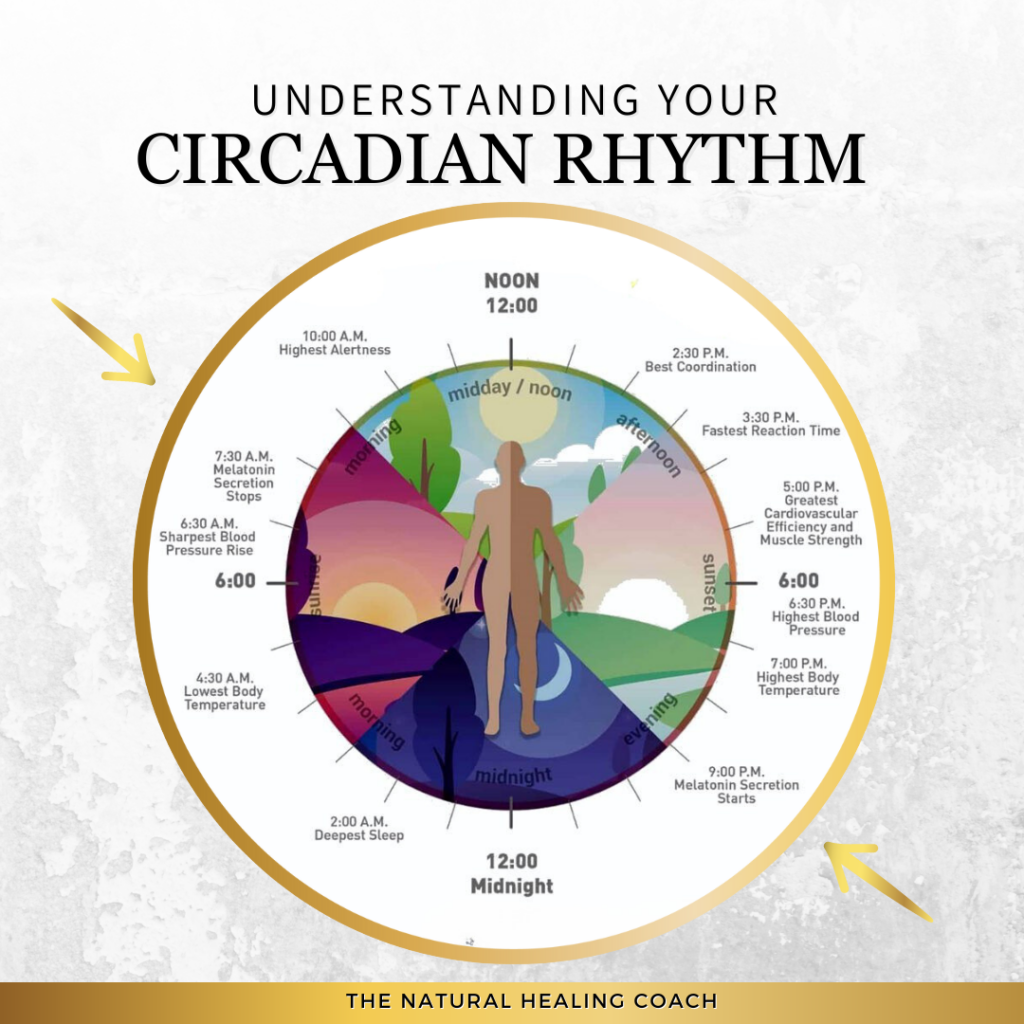
Circadian rhythms are 24-hour cycles that regulate various physiological processes, including the sleep-wake cycle. These rhythms are influenced by external cues such as light and temperature, with light being the most powerful cue.
- Role in Sleep Regulation: Circadian rhythms determine the timing of sleepiness and wakefulness. Disruptions to these rhythms can lead to sleep disorders and other health issues.
- Melatonin’s Influence: Melatonin production is closely tied to circadian rhythms. As natural light decreases in the evening, melatonin levels increase, promoting sleep. Conversely, exposure to morning light decreases melatonin production, promoting wakefulness.
- Influence on Melatonin: Circadian rhythms can be influenced by lifestyle factors such as exposure to artificial light, irregular sleep schedules, and travel across time zones. Maintaining regular light exposure patterns and a consistent sleep schedule can help support healthy melatonin production and circadian rhythm regulation.
Understanding melatonin and its role in regulating circadian rhythms is essential for improving sleep quality and overall health. By optimizing melatonin production, we can achieve better sleep and enhance our well-being.
The Importance of Natural Melatonin Production
Risks of Low Melatonin Levels
Maintaining adequate melatonin levels is essential for good sleep and overall health. When melatonin levels are low, several issues can arise:
- Sleep Disorders: Low melatonin can lead to sleep disorders such as insomnia and irregular sleep patterns. Difficulty falling asleep, staying asleep, or waking up too early can result in chronic sleep deprivation.
- Potential Health Impacts: Insufficient melatonin can weaken the immune system, making the body more susceptible to infections and illnesses. Additionally, low melatonin levels are linked to mood disturbances, such as increased stress, anxiety, and depression. Over time, poor sleep can contribute to chronic health conditions like obesity, diabetes, and cardiovascular disease.
Advantages of Boosting Melatonin Naturally
Enhancing melatonin production naturally offers numerous benefits, promoting better sleep and overall health without the need for supplements:
- Avoiding Dependency on Supplements: Relying on melatonin supplements can lead to dependency and reduced effectiveness over time. Natural methods encourage the body to produce melatonin on its own, supporting sustainable and long-term health.
- Enhancing Overall Health: Natural ways to boost melatonin often involve lifestyle changes that have broader health benefits. For example, increasing exposure to natural light, eating a balanced diet, managing stress, and maintaining regular physical activity can all contribute to improved sleep quality and overall well-being.
- Regulating Sleep-Wake Cycles: Natural melatonin production helps regulate circadian rhythms, ensuring a consistent sleep-wake cycle. This regularity supports better mental and physical performance during the day and more restful, restorative sleep at night.
By focusing on natural methods to boost melatonin, you can improve your sleep quality and overall health. Implementing lifestyle changes that support melatonin production not only helps you avoid the pitfalls of supplementation but also promotes a holistic approach to well-being.
8 Natural Ways to Boost Melatonin
Rather than relying on supplements, which can lead to dependency and inconsistent results, there are effective, natural methods to boost your body’s melatonin levels. These strategies not only promote better sleep but also contribute to overall health and well-being. Here are eight natural ways to increase melatonin production, ensuring you get the restful sleep your body needs.
Importance of Natural Light for Regulating Circadian Rhythms: Natural light plays a crucial role in regulating our internal body clock, or circadian rhythms. Exposure to sunlight helps signal to our bodies when it’s time to be awake and alert, and when it’s time to wind down for sleep.
- Tips
- Spend time outside during the day, especially in the morning. Morning light is particularly effective at setting your circadian rhythm.
- Try to get at least 30 minutes of sunlight exposure daily.
Impact of Screens on Melatonin Production: The blue light emitted by screens (phones, computers, TVs) can interfere with melatonin production. Blue light tricks your brain into thinking it’s still daytime, thereby reducing melatonin levels and making it harder to fall asleep.
- Tips
- Use blue light filters on your devices, especially in the evening.
- Limit screen time for at least an hour before bed. Consider reading a book or practicing relaxation techniques instead.
Establishing Consistent Sleep Habits: A consistent bedtime routine signals to your body that it’s time to wind down and prepare for sleep. This helps regulate your internal clock and improves the quality of your sleep.
- Tips
- Set a regular sleep schedule, going to bed and waking up at the same time every day, even on weekends.
- Include relaxing activities in your bedtime routine, such as reading, taking a warm bath, or practicing gentle yoga.
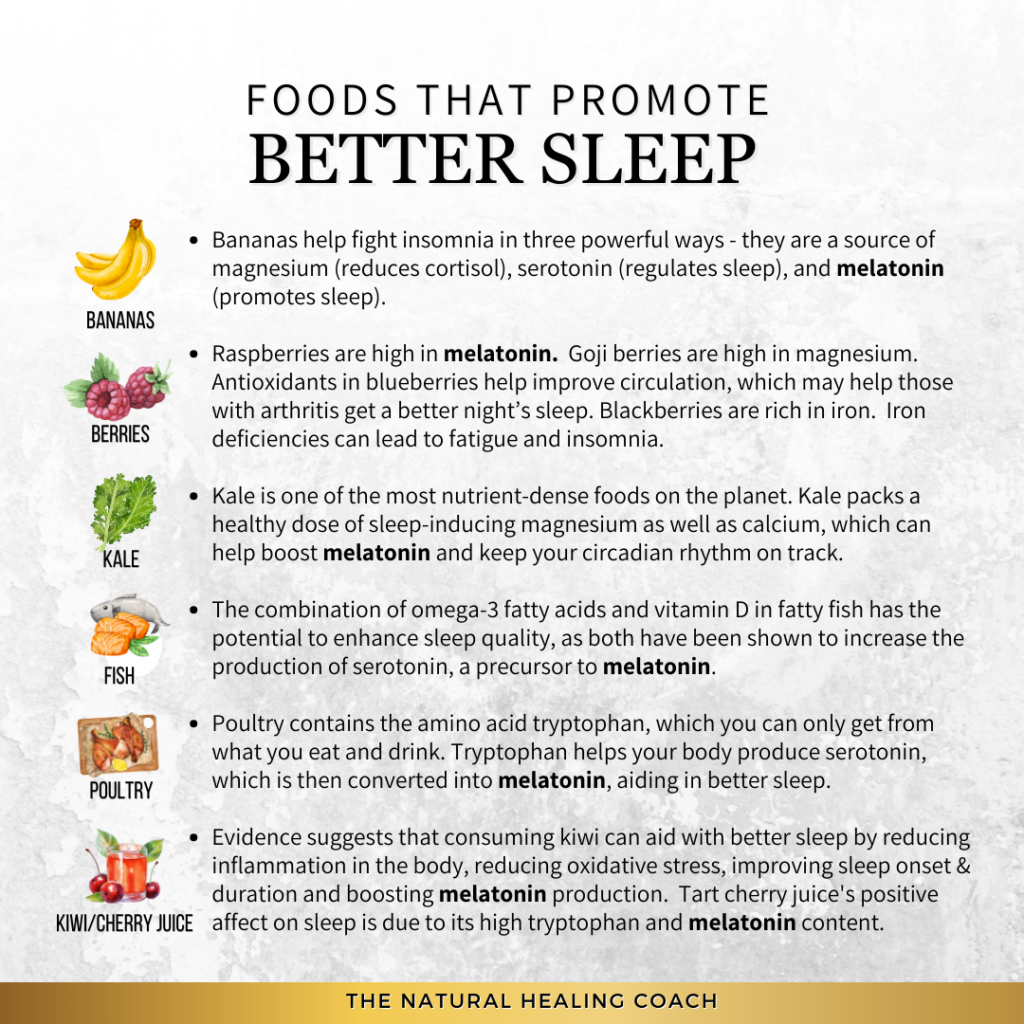
Foods That Promote Melatonin Production: Certain foods can naturally boost melatonin production. These include bananas, berries, kale, cherries and foods rich in tryptophan, an amino acid that helps produce melatonin.
- Tips
- Incorporate melatonin-promoting foods into your diet. Snack on cherries or protein in the evening.
- Include tryptophan-rich foods like turkey, chicken and eggs in your meals.
Natural Remedies That Can Aid Melatonin Production: Herbal teas and certain supplements can help increase melatonin levels. Chamomile tea and valerian root are known for their sleep-promoting properties.
- Tips
- Drink herbal teas like chamomile or valerian root tea before bedtime.
- Consult with a healthcare professional before starting any new supplements.
Connection Between Physical Activity and Better Sleep: Regular physical activity can enhance sleep quality and help regulate melatonin production. Exercise boosts overall health and can help reduce stress, which in turn promotes better sleep.
- Tips
- Engage in moderate exercise, such as walking, swimming, or yoga, for at least 30 minutes most days of the week.
- Avoid intense workouts close to bedtime, as they can increase adrenaline levels and make it harder to fall asleep.
Stress Affects Melatonin Levels: Chronic stress can disrupt melatonin production and negatively impact sleep. Managing stress is essential for maintaining healthy melatonin levels and promoting restful sleep.
- Tips
- Practice relaxation techniques such as meditation, deep breathing exercises, or progressive muscle relaxation.
- Engage in activities that reduce stress and promote relaxation, like spending time in nature, reading, or listening to calming music.
The Role of Darkness in Melatonin Production: Darkness signals to your body that it’s time to produce melatonin and prepare for sleep. A dark sleep environment helps ensure optimal melatonin production.
- Tips
- Use blackout curtains or blinds to block out external light sources.
- Avoid light exposure at night by using dim lights or nightlights if necessary, and avoid looking at screens right before bed.
By incorporating these natural strategies into your daily routine, you can boost your melatonin levels and enjoy better sleep quality and overall health.
Practical Tips for Implementing Melatonin Boosting Strategies
Starting Small
Gradually incorporating these tips into your daily routine is key to making lasting changes. Begin with one or two strategies that seem most manageable and gradually add more as you become comfortable. For instance, you might start by spending more time outside during the day or reducing screen time before bed. Small, consistent changes can lead to significant improvements in your sleep quality over time.
Consistency is Key
Consistency is crucial for reaping long-term benefits from these strategies. Establishing a regular sleep schedule, sticking to your bedtime routine, and consistently making healthy lifestyle choices will help regulate your circadian rhythm and promote better sleep. For instance, set a regular sleep schedule, going to bed and waking up at the same time every day, and create a relaxing bedtime routine that you follow consistently.
Personalize Your Approach
Adjusting these tips to fit your individual lifestyle and needs can make them more effective and sustainable. Consider your daily schedule, personal preferences, and specific challenges when implementing these strategies. Choose activities and foods that you enjoy and can easily integrate into your routine. For example, if you enjoy reading, incorporate it into your bedtime routine, or select melatonin-promoting foods that you like to eat. Tailoring these tips to your unique situation will help you integrate them seamlessly into your life and maximize their benefits.
What Else You Need to Know About Melatonin
Melatonin Supplements
While natural methods to boost melatonin are preferable, melatonin supplements can be beneficial in certain situations:
- Uses: Melatonin supplements are commonly used to treat sleep disorders such as insomnia, jet lag, and shift work sleep disorder. They can also be helpful for individuals with delayed sleep phase disorder or certain circadian rhythm disorders.
- Dosage and Timing: The appropriate dosage of melatonin supplements can vary widely depending on the individual and the specific sleep issue. It’s generally recommended to start with a low dose (0.5 to 1 mg) and gradually increase if needed. For best results, melatonin should be taken 30 minutes to an hour before bedtime.
- Side Effects: Melatonin is generally considered safe, but some people may experience side effects such as dizziness, headaches, nausea, or drowsiness. It’s important to consult with a healthcare professional before starting melatonin supplements, especially if you have any underlying health conditions or are taking other medications.
Broader Health Benefits
Melatonin is not only crucial for sleep but also offers various other health benefits:
- Antioxidant Properties: Melatonin is a powerful antioxidant that can neutralize harmful free radicals in the body, potentially reducing the risk of chronic diseases such as cancer and cardiovascular disease.
- Anti-Inflammatory Effects: Melatonin has anti-inflammatory properties, which can help in reducing inflammation associated with conditions like arthritis and inflammatory bowel disease.
- Immune System Support: Melatonin can enhance immune function, helping the body fight infections and reducing the severity of illnesses.
Melatonin and Age
Melatonin production tends to decrease with age, which can contribute to sleep difficulties in older adults:
- Children and Adolescents: Melatonin levels rise during childhood and adolescence, supporting healthy sleep patterns. However, exposure to screens and irregular sleep schedules can disrupt melatonin production. Encouraging healthy sleep habits and minimizing evening light exposure can help.
- Adults: For adults, maintaining a consistent sleep schedule and managing stress are key to supporting melatonin production and overall sleep quality.
- Older Adults: As melatonin production decreases with age, older adults may benefit from natural methods to boost melatonin, as well as potential supplementation under the guidance of a healthcare professional.
Interactions with Medications and Health Conditions
Melatonin can interact with certain medications and health conditions, so it’s important to be aware of these potential interactions:
- Medications: Melatonin can interact with various medications, including blood thinners, immunosuppressants, diabetes medications, and birth control pills. Always consult with a healthcare professional before starting melatonin supplements if you are taking any medications.
- Health Conditions: Individuals with certain health conditions, such as autoimmune disorders, epilepsy, or hormonal disorders, should use melatonin with caution and under medical supervision.
Understanding these additional aspects of melatonin can help you make informed decisions about its use and potential benefits, ensuring you achieve the best possible outcomes for your sleep and overall health.
How Melatonin Can Impact Those with Autoimmune Disease
Melatonin is not only essential for regulating sleep but also offers several benefits that can be particularly advantageous for individuals with autoimmune disease. As previously mentioned, autoimmune disease occurs when the immune system mistakenly attacks the body’s own tissues, leading to chronic inflammation and a variety of symptoms. Understanding how melatonin influences immune function, sleep quality, stress levels, and inflammation can help individuals with autoimmune conditions manage their symptoms more effectively. This section explores the multifaceted impact of melatonin on autoimmune disease and provides practical considerations for its use.
Immune System Regulation
Melatonin plays a crucial role in modulating immune responses, which is particularly beneficial for individuals with autoimmune disease. It helps regulate the immune system, potentially reducing the severity and frequency of autoimmune flare-ups. By balancing immune activity, melatonin can help minimize the overactive immune responses that characterize autoimmune conditions.
Improved Sleep
Quality sleep is vital for managing autoimmune disease, as poor sleep can exacerbate symptoms and weaken the immune system. Melatonin can help individuals with autoimmune disease achieve restorative sleep by regulating the sleep-wake cycle and promoting deeper, more consistent sleep. Improved sleep quality can lead to better overall health and a reduction in autoimmune symptoms, such as fatigue and pain.
Reduced Stress and Anxiety
Chronic stress and anxiety are common in individuals with autoimmune disease and can worsen their condition. Melatonin has calming effects that can reduce stress and anxiety levels. By lowering stress, melatonin can help prevent autoimmune flare-ups and improve overall well-being for those with autoimmune conditions.
Antioxidant Properties
Melatonin is a powerful antioxidant that helps neutralize harmful free radicals in the body. This antioxidant property is particularly beneficial for individuals with autoimmune disease, as it can reduce oxidative stress and inflammation. Lowering inflammation can help manage and alleviate the symptoms of autoimmune conditions, leading to less pain and improved function.
Potential for Symptom Relief
By regulating the immune system, improving sleep, reducing stress, and providing antioxidant benefits, melatonin can help alleviate the symptoms of autoimmune disease. Individuals may experience reduced pain, less fatigue, and an overall improved quality of life when melatonin levels are optimized.
Considerations and Recommendations
When considering melatonin for autoimmune disease management, it’s essential to use the correct dosage and timing, and be aware of potential cautions:
- Dosage and Timing: The appropriate dosage of melatonin can vary based on individual needs and specific autoimmune conditions. It is generally recommended to start with a low dose (0.5 to 1 mg) and adjust as necessary. Melatonin should be taken 30 minutes to an hour before bedtime.
- Consulting Healthcare Professionals: It’s crucial to consult with a healthcare professional before starting melatonin supplements, especially for individuals with autoimmune disease. A healthcare provider can provide personalized recommendations and monitor any potential interactions with other medications or treatments.
- Cautions: While melatonin is generally safe, it may interact with certain medications, such as immunosuppressants, anticoagulants, and diabetes medications. Additionally, some individuals may experience side effects like dizziness, headaches, or daytime drowsiness. Therefore, professional guidance is essential to avoid complications.
By understanding how melatonin can impact those with autoimmune disease and implementing it carefully, individuals can potentially experience significant improvements in their condition and overall well-being.
Final Thoughts
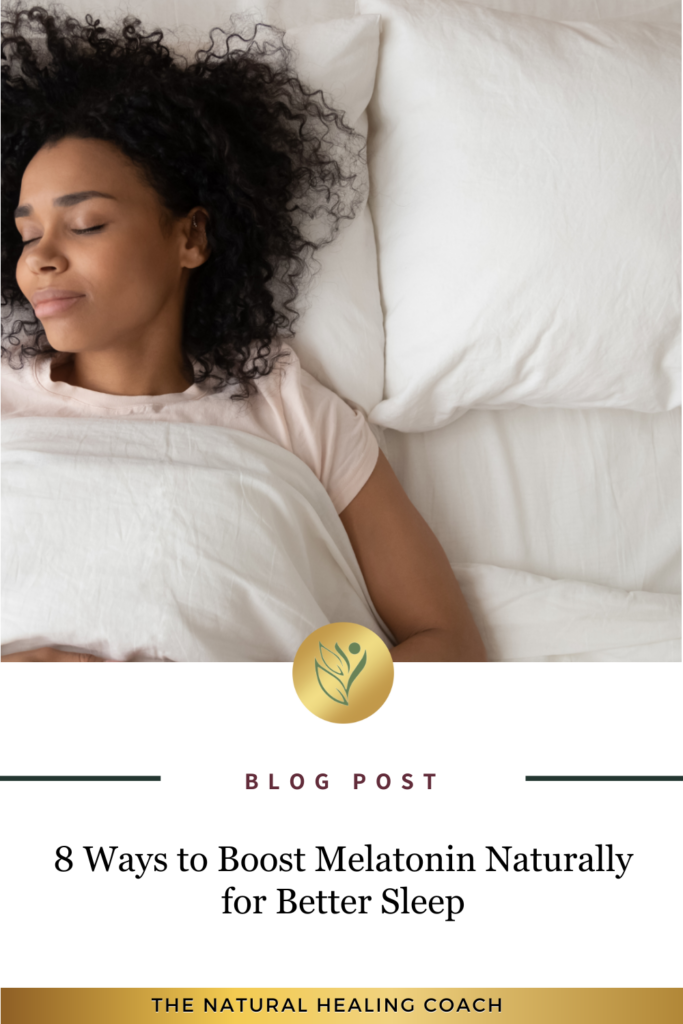
Boosting melatonin naturally can significantly improve your sleep quality and overall health. By incorporating lifestyle changes such as increasing sunlight exposure, limiting blue light, establishing a bedtime routine, and making dietary adjustments, you can enhance your body’s natural melatonin production. These strategies not only help regulate your sleep-wake cycle but also contribute to better immune function, mood regulation, and overall well-being.
For individuals with autoimmune diseases, optimizing melatonin levels can offer additional benefits, including immune system regulation, reduced inflammation, and improved symptom management. Embracing these natural methods can lead to more restful nights and healthier days.
Call to Action
We encourage you to try these natural ways to boost melatonin and see how they improve your sleep and well-being. Have you tried any of these strategies, or do you have other tips to share? We’d love to hear from you! Share your experiences and additional tips in the comments below. Your feedback and insights can help others on their journey to better sleep and overall health
If you are looking for more tips and support, join me over on my group page, The Village – A Natural HEALing Community, to get tons of information and tips to help you take your HEALTHY EATING and ACTIVE LIVING to the next level.
REFERENCES:
- National Center for Complementary and Integrative Health. “Melatonin: What You Need to Know.” https://www.nccih.nih.gov/health/melatonin-what-you-need-to-know
- Sleep Foundation. “How Melatonin Affects Sleep.” https://www.sleepfoundation.org/melatonin
- Mayo Clinic. “Melatonin: A Hormone That Controls Sleep.” https://www.mayoclinic.org/tests-procedures/melatonin/about/pac-20385044
- Healthline. “8 Ways to Increase Melatonin Levels Naturally.” https://www.healthline.com/nutrition/melatonin
- WebMD. “Melatonin: Uses, Side Effects, Interactions.” https://www.webmd.com/vitamins/ai/ingredientmono-940/melatonin
- Cleveland Clinic. “Melatonin: How Much Should I Take for a Good Night’s Rest?” https://health.clevelandclinic.org/melatonin-dosage/
- Harvard Health. “Melatonin and Sleep: What You Need to Know.” https://www.health.harvard.edu/blog/melatonin-and-sleep-2019021817191
- American Sleep Association. “Melatonin and Sleep.” https://www.sleepassociation.org/about-sleep/melatonin-and-sleep/
MORE RELATED POSTS:




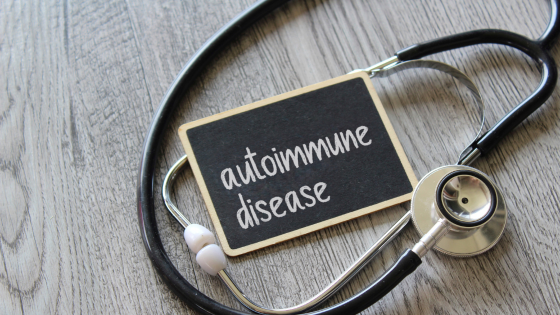







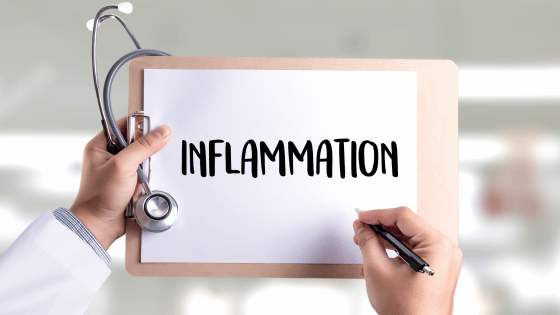
+leave a comment . . .